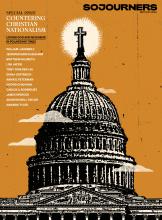THIS SUMMER, THE Biden administration issued an executive order imposing harsh limits on those seeking asylum at the U.S.-Mexico border and intensified deportations of those who no longer qualify to stay in the U.S. In the ensuing debate, many have argued that the new limits violate U.S. laws and treaty obligations. There is genuine outrage about the immorality of denying refuge to those seeking protection on our soil — an act that ignores the role the U.S. has played in fomenting political crises in many of the originating nations. Biden’s immigration policies have been fairly humane; this new policy is disappointing.
Immigration and refugee crises are always subject to becoming weaponized, and they are thus issues of vulnerability for politicians. The former administration demonized immigrants and imposed extremely harsh family separation policies. Refugees and asylum seekers become collateral damage in political partisanship — but these are real families fleeing real threats. Justice should serve the powerless, not the powerful, however well-intentioned the powerful may be. In summer 2013, Congress nearly passed a bipartisan comprehensive immigration reform bill. At the last moment, far-right members of the House of Representatives scuttled years of work. A successful bill would have made immigration far less of a political football and provided immigrants a more stable path to citizenship. Justice should be executed based on the hopes and existential needs of those adversely impacted by unjust structures and policies — both past and present.
Read the Full Article

